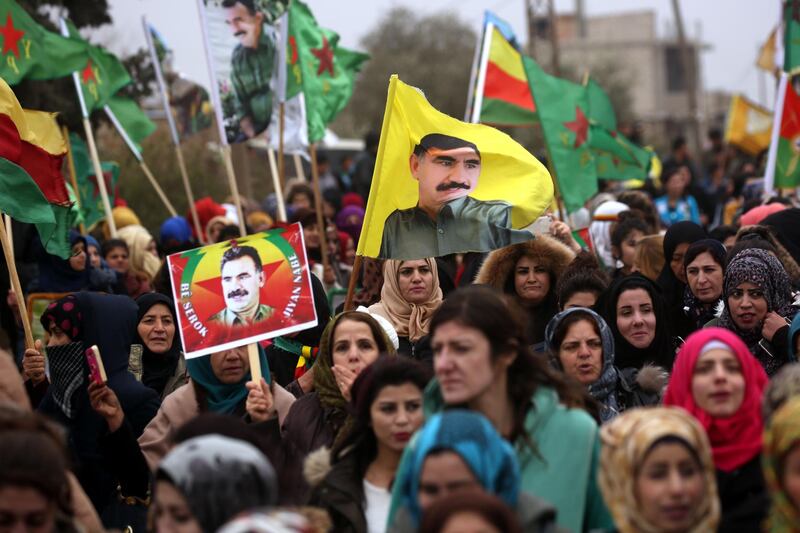Turkish planes on Saturday launched air strikes on Syrian Kurdish militias in Afrin, a military escalation likely to complicate US attempts to end the war.
There were also clashes on the ground as Syrian Kurdish fighters of the People's Protection Units (YPG) said they had engaged Turkish troops attempting to cross the border.
President Recep Tayyip Erdogan announced earlier in the day that ground operations had begun, as Turkish-backed Arab militias affiliated with the Free Syrian Army (FSA) made their way across the border into Syria.
"The Afrin operation has de-facto been started on the ground," Mr Erdogan said in a televised speech in the city of Kutahya on Saturday, without specifying whether Turkish troops had also crossed the border.
Turkey is targeting has been targeting the YPG, a Syrian Kurdish militia with links to the Kurdistan Workers' Party (PKK) - a Kurdish separatist group that has been fighting the Turkish government for over three decades. Ankara considers the PKK and the YPG terrorist organisations.
In recent years the YPG has taken control of Afrin and other areas of northern Syria as the Syrian government has shifted its military resources to other parts of the country to fight rebel forces seeking the overthrow of president Bashar Al Assad.
YPG and Al Assad’s forces have generally maintained a détente, not least because they both view the Turks as enemies.
Egid Rashid, head of Afrin's media office said that Turkish troops had attempted to cross the border near the village of Baliya on Friday but had been repelled by the YPG.
The YPG also forms the core of the US-backed Syrian Democratic Forces (SDF). Tensions between Turkey and the US are likely to escalate.
While the US military has said it will continue to support the SDF, the US does not have a presence in Afrin. This means that clashes between Turkish forces and the YPG would not necessarily bring Turkish and US troops into direct conflict.
_______________
Read more:
Turkey seeks Russian approval for air campaign against Afrin
US military retracts statement on 'border force' in Syria
Erdogan says Turkish operations against Kurdish militias in Syria will be supported by rebels
_______________
Demonstrations in support of the YPG were held in Afrin on Thursday.
"The people of Afrin will resist the Turkish occupation, they support the YPG," Mr Rashid told The National.
The Turkish military began to escalate its cross-border shelling of Afrin a week ago as it reinforced troops in the area. Tensions escalated following an announcement by the American military that the SDF would be repurposed as a “border protection force,” leading Mr Erdogan to vow he would “strangle” such a force “before it was even born.”
On Thursday, the US backtracked, saying the force was only intended to prevent the return of ISIL in areas it had been pushed out of last year.
“This is not a new "army" or conventional "border guard" force,” the US statement read.
Mr Erdogan also said that an operation against the Kurdish-controlled city of Manbij would follow. Manbij is part of a larger Kurdish-controlled area in which the US has a presence.
"The promises made to us over Manbij were not kept. So nobody can object if we do what is necessary," said Mr Erdogan, referring to past American assurances that the YPG would move out of Afrin. "Later we will, step by step, clear our country up to the Iraqi border from this terror filth that is trying to besiege our country."
It is unclear whether the US will act as a mediator between the Kurds and the Turks.
“The PYD think they have become allies to the Americans, but I'm not sure the Americans are looking at them like that,” said Shams Al Din Hamo, a politician from Afrin. The PYD - or Democratic Union Party - is the political branch of the YPG.
Meanwhile in Idblib, media affiliated with Hizbollah reported the capture of Abu Duhor by the Syrian military and its allies, a military airport in the northwestern province of Idlib.
Idlib is the last Syrian province dominated by rebels. The government and its allies launched an offensive to recapture it last month. Abu Duhor could provide a strategic base for the government to retake the rest of the province.
Many of the rebel groups the Syrian government is fighting in Idlib have Turkish backing, and the Turkish government has complained that Damascus has failed to adhere to recent “de-escalation” agreements to help reduce fighting in the province.
*Additional reporting by AFP, AP and Reuters





